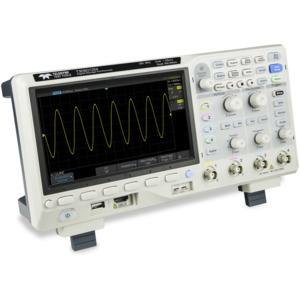
- Description
- Specifications
- Documents
Teledyne Test Tools T3DSO1000 series Oscilloscopes feature both two channel and four channel models.
The four channel T3DSO1204 Oscilloscope is a 200 MHz model incorporating two 1 GSa/s ADCs and two 14 Mpts memory modules. When all channels are enabled, each channel has sample rate of 500 MSa/s and a standard record length of 7 Mpts. When only a single channel per ADC is active, the maximum sample rate is 1 GSa/s and the maximum record length is 14 Mpts.
The T3DSO1204 comes with free enabled serial bus triggering and decode options supporting protocols I2C, SPI, UART, RS232, CAN and LIN. For ease -of -use, the most commonly used functions can be accessed with its user- friendly front panel design.
The T3DSO1204 model come with additional features that include even more functions, including: searching and navigating, on-screen Bode plot, 16 digital channels (Optional), an external USB powered 25 MHz AWG module (Optional) and a USB WIFI adapter (Optional). The T3DSO1204 model comes with a 7" Color Display.
Highlights- With a waveform capture rate of up to 400,000 wfm/s (sequence mode), the oscilloscope can easily capture the unusual or low-probability events.
- FFT, addition, subtraction, multiplication, division, integration, differential, square root which enables speedy extraction of results from waveforms and measurements.
- 256-Level Intensity Grading and Color Temperature Display. New display technology provides for fast refresh rates. The resulting intensity-graded trace is brighter for events that occur with more frequency and dims when the events occur with less frequency.
- History Waveforms (History) Mode and Segmented Acquisition (Sequence). Playback the latest triggered events using the history function. Segmented memory collection will store trigger events into multiple (Up to 80,000) memory segments. Each segment will store triggered waveforms and timestamp each frame.
- Gate and Zoom Measurement. Through Gate and Zoom measurement, the user can specify an arbitrary interval of waveform data analysis and statistics. This helps avoid measurement errors that can be caused by invalid or extraneous data, greatly enhancing the measurements’ validity and flexibility.
